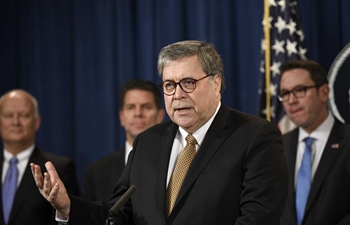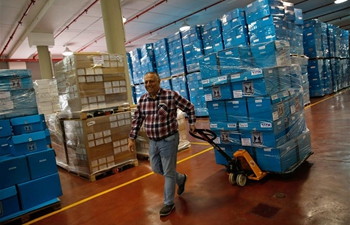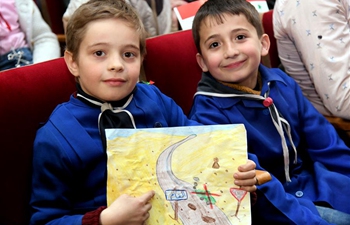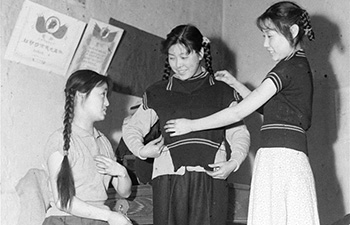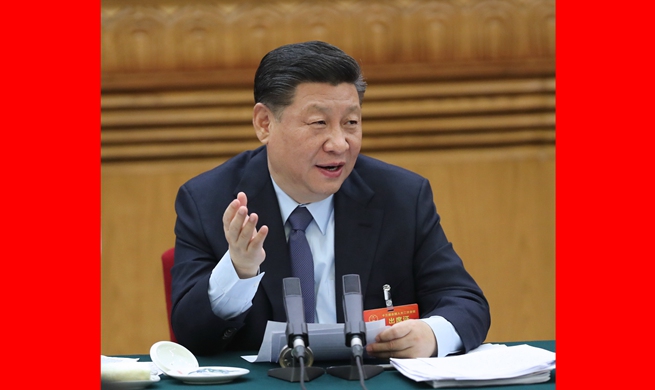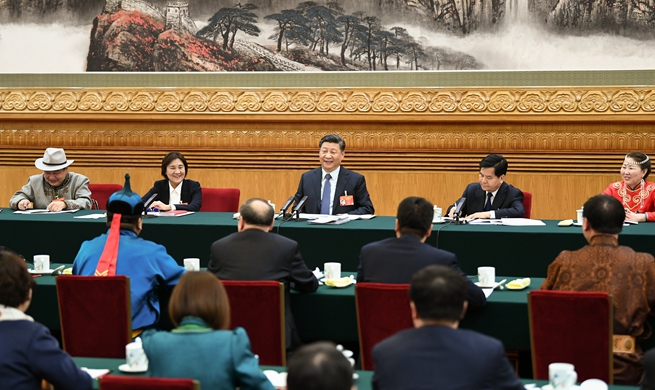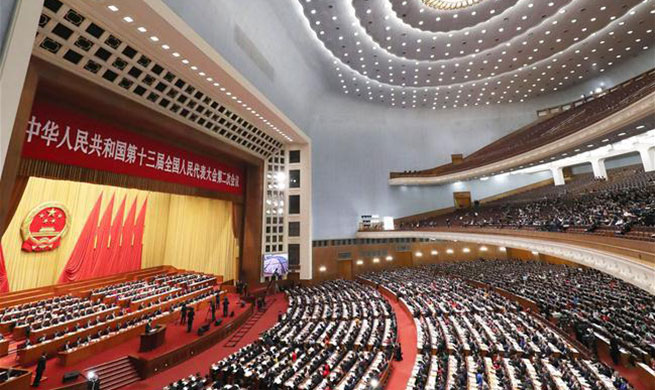ROME, March 8 (Xinhua) -- Italy on Friday marked International Women's Day with official events, marches, and a national strike as women called for equality in the workplace and an end to gender violence, among other issues.
In Rome, President Sergio Mattarella celebrated the day at the Quirinal Presidential Palace, which was decorated with masses of yellow mimosa flowers, the symbol of International Women's Day, and watched over by an all-female guard of honor.
Titled "Never Slaves Again", the ceremony, attended by Prime Minister Giuseppe Conte and top government officials, included testimony from two women who were forced into prostitution, as well as a female prosecutor who specializes in sex trafficking cases.
In a speech, Mattarella decried "the ignoble exploitation of women and girls" who flee extreme poverty, war, and drought only to "end up in the hands of unscrupulous criminal organizations that profit off the bodies and souls of women, and do not hesitate to use threats, violence, and the most brutal coercion."
"No compromise or tolerance are acceptable -- sex trafficking must be eradicated," Mattarella said, adding that gender equality means not only freedom from violence but also equal pay for equal work.
"All the indicators agree on the fact that a country's economic and social progress goes hand in hand with the development of female employment," Mattarella said.
"However, many women still encounter obstacles in deploying their talents, are threatened by poverty, oppressed by violence, handicapped by additional burdens...between work and caring for their families, underpaid or excluded from stable jobs in spite of being skilled and worthy."
The ceremony also marked the 20th anniversary of women being allowed into the military, and was attended by female officers from the Air Force, the Army, and the Navy.
The Defense Ministry, which is headed by Elisabetta Trenta, tweeted a composite photo of Italian women in uniform, including a female Air Force pilot, saying: "on International Women's Day, we celebrate all our female colleagues, both civilian and military, who every day uphold our security and defense in the interests of the country and its citizens."
Out on the streets of the capital, thousands of women and men marched against gender violence and for equal pay under the Non Una Di Meno (Not One Less) campaign banner as part of a nationwide women's strike and mobilization that also took place in countries around the world.
Similar marches took place in some 40 cities, including Milan, Pisa, Bologna, Genoa, Florence, Venice, Turin, Naples, and Cagliari, according to the Non Una Di Meno Facebook page, where activists posted photos and videos from across Italy.
The strike affected both public and private sectors, including transportation, as buses and subways were reduced to a minimum in several cities including Rome and Naples, Italian news agency ANSA reported.
Italy's "big three" trade unions, which also joined the national women's strike, organized a campaign called "Her Name Will Be Futura", calling for gender-based collective bargaining to create an equal playing field between men and women in the workplace.
Between them, the "big three" unions represent about 10.8 million workers in a country of 60 million people, according to official union membership and ISTAT national statistics agency.
Maurizio Landini, who leads the biggest and the most left-leaning of the three unions --the General Confederation of Italian Labor (CGIL), said that "March 8 is not just a holiday but a day of struggle. We need a cultural change to bring gender differences into job relations. Beginning with a change on the part of men."
Also on Friday, Interior Minister Matteo Salvini announced on Twitter that "today we will submit two bills. One eliminates reduced sentences for murderers and rapists. The second calls for a woman to be heard by a magistrate within three days of filing a harassment report."
If approved, the second bill would address a frequent complaint from women's groups who support domestic violence and harassment victims, who say they often fear reporting abusive partners or stalkers to the police because under current law, it takes too long for authorities to step in to protect them.
Salvini's announcement came in the wake of two violent murders of women by their male partners on Thursday, and of a gang rape that took place at a public transport station in Naples earlier in the week.

